
|
Sale 66
The Manuscript, Space, Stamp & Collectibles Auction
| Lot |
Photo |
Description |
Realized |
Lot 169 |
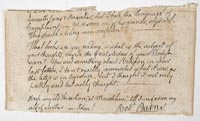 |
Burns, Robert (1759-96) National poet of Scotland. Partial Autograph Letter Signed ("Robt. Burns"), 5 x 9 inches, n.p., n.d. To an unidentified correspondent: "…uncouth cares & anxieties, but I hate the language of Complaint. Job, or some one of his friends, says well, 'Why should a living man complain?' What books are you reading, or what is the subject of your thoughts, beside the great studies of your profession? You said something about Religion in your last letter [letter is crossed out]. I don't exactly remember what it was as the letter is in Ayrshire, but I thought it not only prettily said but nobly thought. Keep my old Direction, 'at Mauchline,' till I inform my self of another. Adieu! Robt. Burns." Ragged upper edge where the sheet was torn; overall toning and scattered foxing, but boldly penned and signed.
Estimated Value $3,000 - 5,000,
From the Collection of Henrik Minc,
View details and enlarged photo
| Realized
$3,600 |
Lot 170 |
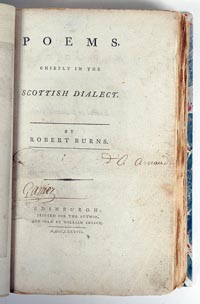 |
[Burns, Robert], Poems, Chiefly in the Scottish Dialect. Edinburgh: Printed for the Author, and sold by William Creech. M,DCC,LXXXVII. [E2] [M41726] [C2]. First Edinburgh Edition. "Skinking Issue" (line 3 on page 263 reads correctly: "Auld Scotland wants nae skinking ware"). "Roxburgh" is misprinted "Boxburgh" on page xxxvii of the List of Subscribers.
Contents: Pp xlviii + [9]-368: [i]-[ii], half title missing; [iii], title page; [iv], Registration; [v]-viii, Dedication ix-xlvi, Subscribers' Names with Addenda; xlvii-xlviii, Table of Contents; [9]-368, Text and Glosary.
Original Material: Death and Doctor Hornbook. A True Story; The Brigs of Ayr, A Poem; The Ordination; The Calf; Address to the Unco Guid, or the Rigidly Righteous; Tam Samson's Elegy; A Winter Night; To a Haggis; Address to Edinburgh; John Barleycorn. A Ballad; Green Grow the Rashes. A Fragment; etc.
Total printed, both issues, 2,894 copies (according to I.R. Grant.) "I have both a second and a third Edition going on as the second was begun with too small a number of copies….The whole I have printed is three thousand." (From Burns' letter to Mrs. Dunlop dated 22 March 1787.) The publication of this edition was announced in the following advertisement that appeared in the Edinburgh Advertiser on 17 April 1787: "This day is published, Price Five Shillings, by…William Creech, Handsomely bound in one volume. 8vo, and embellished with the Head of the Author, elegantly engraved by Beugo, Poems, Chiefly in the Scottish Dialect, by Robert Burns" [E]. 9 x 5¾ in. (22.5 x 14.5 cm), untrimmed. Closed tear on page 163/164. Rebound in modern half calf.
Estimated Value $2,000 - 3,000,
From the Collection of Henrik Minc,
View details and enlarged photos
| Unsold |
Lot 171 |
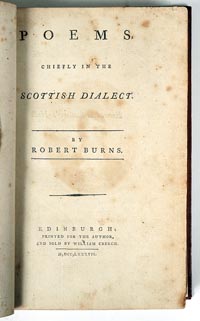 |
[Burns, Robert], Poems, Chiefly in the Scottish Dialect. Edinburgh: Printed for the Author, and sold by William Creech. M,DCC,LXXXVII [E2] [M311219] [C2]. First Edinburgh Edition. "Stinking Issue" (line 3 on page 263 reads incorrectly: "Auld Scotland wants nae stinking ware"). The two 1787 editions also differ in many points of spelling and punctuation (see Murdoch, Jas. Barcley, "The Second Edition of Burns," Burns Chronicle 1895). A half title. Nineteenth century full calf rebound, modern end papers; original spine laid down; two previous owners' names on end papers. 8¼ x 5½ in. (20.6 x 12.9 cm), trimmed. Otherwise, description as in above lot. From the collection formed by Professor Robert Dewar of Reading University, editor of Robert Burns, Poetry and Prose, 1929. The book carries his pencilled annotations, filling Burns' lacunae.
Estimated Value $2,000 - 3,000,
From the Collection of Henrik Minc,
View details and enlarged photos
| Realized
$2,400 |
Lot 172 |
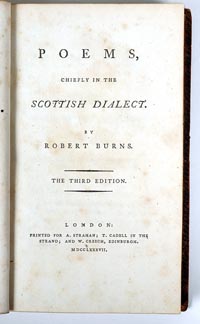 |
[Burns, Robert], Poems, Chiefly in the Scottish Dialect. The Third Edition. London: Printed for A. Strahan;;T. Cadell in the Strand; and W. Creech, Edinburgh. MDCCLXXXVII. First London Edition. Set from the "Stinking Issue" of the First Edinburgh Edition. There is no evidence that Burns was personally involved in any way with the London edition [C]. This edition was last advertised on November 6, 1787, to sell for seven shillings; however, according to a review in the Monthly Review in December 1787, the actual price was 6s [E]. Complete with a half title and a portrait engraved by J. Beugo. Nineteenth century calf rebacked. 8½ x 5¾ in. (21.8 x 13.7 cm), trimmed. From the estate of Hugh Walpole in Kingston on Thames in 1952 (according to its subsequent owner, James Alexander McCash, Gallowhill Farm, Kirkintilloch, whose bookplate is present).
Estimated Value $1,500 - 2,000,
From the Collection of Henrik Minc,
View details and enlarged photos
| Unsold |
Lot 173 |
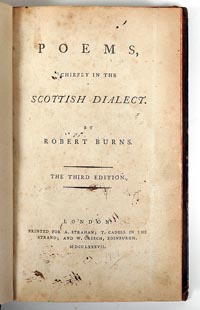 |
[Burns, Robert], Poems, Chiefly in the Scottish Dialect. The Third Edition. London: Printed for A. Strahan; T. Cadell in the Strand; and W. Creech, Edinburgh. MDCCLXXXVII. [E5] [M6904] [c4]. First London Edition. Bound without the half-title and portrait. Nineteenth century calf rebacked. 8½ x 5½ in. (20.7 x 13.0 cm.); otherwise, same as the preceding book.
Estimated Value $1,500 - 2,000,
From the Collection of Henrik Minc,
View details and enlarged photos
| Unsold |
Lot 174 |
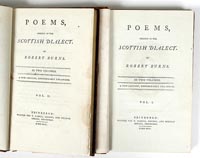 |
[Burns, Robert], Poems, Chiefly in the Scottish Dialect. In two Volumes. A new edition, considerably enlarged. Edinburgh: Printed for T. Cadell, London, and William Creech, Edinburgh. M DCC XCIV. [E29] [M52101].
Contents. Volume I: Pp. xii + 238: [i], Half-title; [ii], Registration; [iii], Title page; [iv], blank; [v] - viii, Dedication to the Caledonian Hunt; [ix] - xi, Table of Contents; [xii], blank; [1] - 237, Text; [238], blank; 1 blank leaf. Volume II: Pp. iv = 284; [i] Half-title; [ii] blank; [iii], Title page; [iv], Registration; [1] - 238, Text and Glossary; [284] blank. A reprint, but with additional errors, of [E23] [E]. The last Edinburgh Edition printed in the poet's lifetime. Volume I has frontispiece portrait engraved by John Beugo. Each volume has a bookplate of William Roger Snow and of Sir John William Lubbock, Bart. Volume II has tear in margin of pages 221/222. 7¾ x 5 in. (19.1 x 11.4 cm), trimmed. Contemporary full calf.
Estimated Value $1,000 - 1,200,
From the Collection of Henrik Minc,
View details and enlarged photos
| Realized
$1,080 |
Lot 175 |
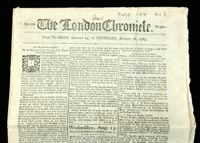 |
[Burns, Robert], "Despondency, An Ode," in The London Chronicle, Vol. LXII. No. 480, p.158. From Tuesday, August 14 to Thursday, August 16, 1787. This is the third edition of the ode. It was originally published in the Kilmarnock Edition (pp.156-159) on July 31, 1786, and then on Alpril 17, 1787 in the First Edinburgh Edition (pp 220-223). There are minor differences between the original and the present versions in spelling, capitalization, use of italics and punctuation. Also, instead of "those pleasures," in line 49, and "That active man," in line 68, the present version has "these pleasures" and "The active man" in the corresponding places. The Chronicle is a complete 8-page issue printed on hand-made laid paper. Rare.
Estimated Value $800 - 1,000,
From the Collection of Henrik Minc,
View details and enlarged photos
| Realized
$1,080 |
Lot 176 |
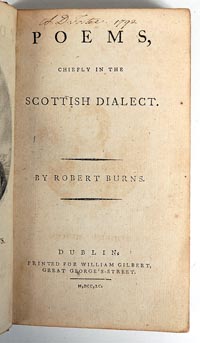 |
[Burns, Robert], Poems, Chiefly in the Scottish Dialect. Dublin: Printed for William Gilbert, Great George's-Street. M,DCC,XC. [E18] [M1790]. The Belfast Edition [E17] with a Dublin publisher's name. Frontispiece portrait engraved by P. Halpin. Contents: Pp. xii + 274: [i], Title page; [ii], blank; [iii] - vi, Dedication to the Caledonian Hunt; vii-x, Extract from The Lounger, No. 97; [xi-xii] - Table of Contents; [1] - 274 Text and Glossary; 1 blank leaf. The Table of Contents and the Text copied from Irish pirated editions which were copied from the "stinking issue" of the First Edinburgh Edition [E2]. Glossary enlarged. Bookplate of Lord Dufferin of Claneboye, and his signature on flyleaf. Signature, "A.D. Foster. 1792" on title page. Format: 6¾ x 4¼ in. (17.3 x 9.8 cm). Trimmed and bound in contemporary calf.
Estimated Value $800 - 1,000,
From the Collection of Henrik Minc,
View details and enlarged photos
| Realized
$1,020 |
Lot 177 |
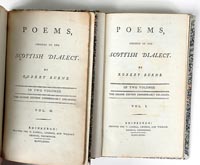 |
[Burns, Robert], Poems, Chiefly in the Scottish Dialect. In two Volumes. The second Edition, considerably engarged. Edinburgh: Printed for T. Cadell, London, and William Creech, Edinburgh. M,DCC,XCIII. Second Edinburgh Edition. [E25] [M52135] [C8]. "In March or April, Creech seems to have written to Burns asking him what new poems he could provide for a new edition and how much he wanted for them, and Burns replied; "I suppose, at a gross guess that I could addof new materials to your two volumes, about fifty pages. I would also correct & retrench a good deal….A few books which I very much want, are all the recompence I crave, together with as many copies of this new edition of my own works as Friendship or Gratitude shall prompt me to present." [E].
Volume II. Original Material: Lament of Mary queen of Scots on the approach of Spring; Lament for James, Earl of Glencairn; On seeing a Wounded Hare limp by me, which a fellow has just shot at; On the late Captain Grose's Peregrinations thro' Scotland, collecting the Antiquities of that Kingdom; The Humble Petition of Bruar Water to the Noble Duke of Athole; etc.
Half title and portrait engraved by J. Beugo in Volume I; half title in Volume II. 7½ x 4¾ in. (18.3 x 11.1 cm). trimmed. Volume I has a previous owner's name and light pencilled notes on flyleaf. Volume II has small old tape repair at right margin of page 25. Modern quarter calf and marbled covers.
Estimated Value $800 - 1,000,
From the Collection of Henrik Minc,
View details and enlarged photo
| Realized
$960 |
Lot 178 |
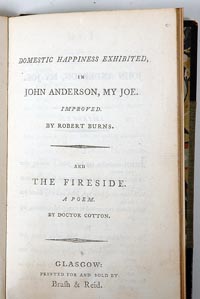 |
[Burns, Robert], Domestic Happiness Exhibited, in John Anderson, My Joe. Improved. by Robert Burns. And The Fireside. A Poem. By Doctor Cotton. Glasgow: Printed by and sold for Brash and Reid. N.d. (E-1795/6) [E32a] [M154715?] [C11]. Contents. [1], Title page; [2] - 4, John Anderson, My Joe. Improved; eight stanzas; 5-8, The Fireside. This is pamphlet XIII of the first volume of Brash and Reid's Poetry: Original and Selected. The pamphlets probably began being published late in 1795 or early in 1796, for by July 18k, 1796, at the latest, the first twenty-four had been published, bound up together, and issued [E]. Only four of these twenty-four contain poems by Burns. The Brash & Reid pamphlets are highly prized by collectors. 6 x 3½ in., trimmed. Nineteenth century rebound, half morocco straight-grain; front cover detached. Parts of a watermark on all four sheets. Inscription on the spine: John Anderson, My Joe - Burns - Glasgow N.D. All edges gilt.
Estimated Value $400 - 600,
From the Collection of Henrik Minc,
View details and enlarged photo
| Realized
$480 |
Lot 179 |
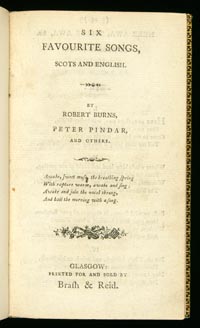 |
[Burns, Robert], Six Favourite Songs, Scot and English. By Robert Burns, Peter Pindar, and others. Glasgow: Printed for and sold by Brash & Reid. N.d. (E-1795/6). [E32a] [M15715?] [C11]. " Awake, sweet muse, the breathing spring"; etc.
Contents. [1], Title page; 2, Here Awa, There Awa, &c. by Robert Burns; 3, English verses to the same air. By Peter Pindar, Esq.; 4-5, Behind Yon Hills, &c. By Robert Burns; 5-8, English verses to the same air. By Dr. Percy. This is pamphlet XXIII of the first volume of Brash and Reid's Poetry: Original and Selected. For further details of the collected pamphlets see the preceding book description. Only the second stanza of "Behind on hills" in this pamphlet differs significantly from the version in [K]. Other differences are minor, mainly concerning spelling and punctuation. Bookplate of William F. Gable. Parts of watermark on all four sheets. Nineteenth-century binding in straight-grain morocco, with five raised bands. Gilt inscription on spine: Songs / Robert Burns. 5¾ x 3½ in. (15 x 8.7 cm).
Estimated Value $400 - 600,
From the Collection of Henrik Minc,
View details and enlarged photo
| Realized
$480 |
Lot 180 |
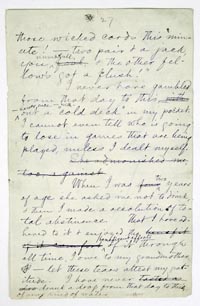 |
Clemens, Samuel (1835-1910) American author and humorist; his nom de plume was Mark Twain. Autograph Manuscript, one page, 7¾ x 5 inches, n.d. (1870). With an original pen and ink drawing by Twain on the verso depicting a caricature of a German soldier. Both the manuscript and the sketch are in purple ink. A working manuscript with many corrections in his hand, of an essay which appeared in the December 1870 issue of The Galaxy, a magazine founded by Col. William C. Church and his brother Francis in 1866. It was titled in the magazine, "Memoranda. by Mark Twain. 'History Repeats Itself'." Many of Twain's early writings appeared in this magazine. William Church, with George Wood Wingate established the National Rifle Association in 1871.
The manuscript is partially complete and has the number "27" at the top. Twain has taken a fictitious article supposedly published in a Hawaiian newspaper quoting a man who, based on his mother's life teachings, abstained from tobacco, gambling, and liquor, and compared it to his own grandmother's words of advice. A copy of the entire essay is included.
This manuscript reads, "…[Put up] those wicked cards this minute! - two pair & a jack, you numskull ["fool" crossed out], & the other fellow's got a flush! I never have gambled from that day to this ["with" crossed out] never once without a 'cold deck' in my pocket. I cannot even tell who is going to lose in games that are being played, unless I dealt myself. ["She admonished me, too, against" crossed out]. When I was ["four crossed out] two years of age she asked me not to drink & then I made a resolution of total abstinence. That I have adhered to it & have enjoyed the ["benefit of it comfort" crossed out] beneficent effects of it through all time, I owe to my grandmother--let these tears attest my gratitude. I have never ["tasted a dro" crossed out] drank a drop from that day to this, of any kind of water. #"
As for the sketch of the German soldier, the Franco-Prussian War was going on (1870-71) and Paris was under siege. Twain's rendering of a large-nosed, squinty-eyed German soldier with enormous muttonchops may even have been his attempt to depict Bismarck.
Estimated Value $6,500 - 8,500
View details and enlarged photos
| Realized
$5,100 |
Lot 181 |
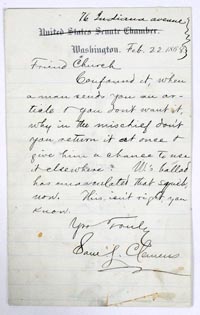 |
Clemens, Samuel, Autograph Letter Signed ("Sam. L. Clemens"), on ruled, printed United States Senate Chamber (crossed out) stationery, with the address "76 Indiana Avenue" in his hand, 1 page, 8 x 5 inches, dated at Washington, Feb. 22, 1868. To Col. William C. Church who, with his brother, Francis, founded The Galaxy in 1866. This was one of the magazines to which Twain submitted articles early in his career. Twain starts his letter with a sarcastic salutation, "Friend Church," then castigates the publisher for not returning an unused article: "Confound it, when a man sends you an article & you don't want it, why in the mischief don't you return it at once & give him a chance to use it elsewhere? W's ballad has emasculated that squib now. This isn't right, you know. Yours truly, Sam L Clemens." Minor soiling and a few rust-colored spots. Boldly penned and signed.
Estimated Value $2,500 - 3,500
View details and enlarged photo
| Realized
$2,280 |
Lot 182 |
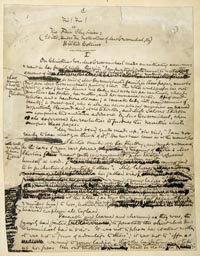 |
Collins, William Wilkie (1824-89) English novelist; one of the first and greatest masters of the mystery story. His mysteries had very skillful and complex plots, influencing the later works of his friend and sometime collaborator Charles Dickins. Collins wrote 25 novels and over 50 short stories. He was immensely popular in his time. Some of his best-known works are No Name (1862), Armadale (1866), The Moonstone (1868), and The New Magdalen (1873).
Autograph Manuscript Signed, Fie! Fie! or The Fair Physician, a story published in The Spirit of the Times, Dec. 23, 1882, 20 pages, 10¾ x 9 inches. The manuscript is entirely written in black ink in Collins' hand, with many holograph corrections, so busy and messy that it is difficult to imagine a publisher accepting this as the printer's copy. Each page is laid to a page in an album, 12¾ x 10½ inches. The covers, now worn and the spine loose and damaged, are trimmed in black morocco with gilt lettering, "Fie! Fie! or The Fair Physician by Wilkie Collins / The Original Manuscript." A cabinet photo of Collins, signed in purple ink, is affixed to the inside cover. The first page has the title written in Wilkie's hand and "(Edited, Under the Instructions of Mrs. Crossmichael, By) Wilkie Collins." The pages are lightly toned, else in fine condition. A unique manuscript by the famous mystery writer.
Note: The April 27, 1895 issue of the London weekly The Publishers' Circular (No. 1504) reports the sale that week at Sotheby's of the corrected proof of this story, as well as manuscripts for two other Wilkie stories, "The Devil's Spectacles" and "Love's Random Shots," and notes that the envelope containing the stories has the following holograph note signed by Wilkie and dated Jan. 10, 1887: "These stories have served their purpose in periodicals, but are not worthy of republication in book form. They were written in a hurry and the sooner they are drowned in the waters of oblivion the better. I desire that they shall not be republished after my death."
Estimated Value $40,000 - 45,000
View details and enlarged photos
| Unsold |
Lot 183 |
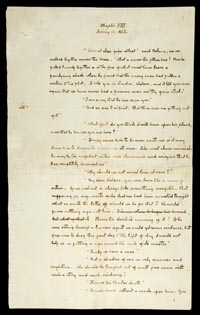 |
Doyle, Sir Arthur Conan (1859-1930) British physician and writer, best known for his detective stories about Sherlock Holmes of Baker Street and his friend and collaborator, Dr. Watson. He also wrote historical novels and, in later life, was an advocate of spiritualism.
Autograph Manuscript, one page, legal folio (12¾ x 8 inches), n.p., n.d. Although unsigned, the manuscript is written entirely in Doyle's hand. One page of the original manuscript for Doyle's fifth "Sherlock Holmes" novel, The Hound of the Baskervilles, published in 1902. The title of the leaf indicates "Chapter XIII, Fixing the Nets," but the contents are actually at the end of Chapter XII, "Death on the Moor."
In full: "'We're at close grips at last,' said Holmes, as we walked together across the moor. 'What a nerve the fellow has! How he pulled himself together in the face of what must have bee a paralysing shock when he found that the wrong man had fallen a victim to his plot. I told you in London, Watson, and I telll you now again, that we have never had a foeman more worthy of our steel.'
'I am sorry that he has seen you.'
'And so was I at first. But there was no getting out of it.'
'What effect do you think it will have upon his plan, now that he knows you are here?'
'It may cause him to be more cautious or it may drive him to desperate measures at once. Like most clever criminals, he may be too confident in his own cleverness and imagine that he has completely deceived us.'
'Why should we not arrest at once/'
'My dear Watson, you were born to be a man of action. Your instinct is always to do something energetic. But supposing for argument's sake that we had him arrested tonight, what on earth the better off should we be for that? We could prove nothing against him. I know where he keeps his hound, but what of it? [This last sentence is crossed out]. There's the devilish cunning of it! If he were acting through a human agent we could get some evidence, but if we were to drag this great dog to the light of day it would not help us in putting a rope round the neck of its master.'
'Surely we have a case.'
'Not a shadow of one - only surmise and conjecture. We should be laughed out of court if we came with such a story and such evidence.'
'There is Sir Charles's death.'
'Found dead without a mark upon him. You…."
After killing Sherlock Holmes off in 1894, Doyle brought him back by popular demand in 1902 in The Hound of the Baskervilles. It proved to be one of the most popular of the series. To promote the book and the return of Holmes, the American publisher (McClure, Phillips & Company, New York) asked Doyle for the original manuscript and mounted an elaborate publicity campaign for the book by breaking up the pages and offering them one by one to dealers. (The other "Sherlock Holmes" manuscripts were not subjected to this treatment and remain complete). Because the pages of this manuscript were written and mounted on highly-acidic paper, many of them did not survive and very few are in as good condition as the page offered here. This particular page is very rare in that it has an actual mention of Holmes' name; only a handful of pages ever say Holmes' name. There are also two mentions of Watson's name on this page, including the famous phrase, "My dear Watson." Equally important is the fact that this page contains a whole scene in which Holmes converses with Dr. Watson about the mysterious murder on the moor. Most of the action in The Hound of the Baskervilles centers on Dr. Watson; Holmes only appears in about one-third of the story.
Archival repairs to folds on verso, otherwise fine. Housed in a custom-made case. An extremely important Doyle manuscript and an extremely rare "Sherlock Holmes"-related document.
Estimated Value $115,000 - 125,000
View details and enlarged photo
| Unsold |
Lot 184 |
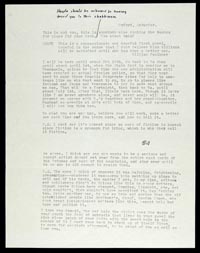 |
Faulkner, William (1897-1962) American author, best known for his novels about the decadent Old South and the grasping, materialistic new South in the town of Jefferson and the Mississippi county he called Yoknapatawpha. He won the 1949 Nobel prize for literature and the Pulitzer Prize for A Fable (1954) and for The Reivers (1962). Some of his major works are The Sound and the Fury (1929), As I Lay Dying (1930), Absalom Absalom! (1936), Go Down Moses (1942),Intruder in the Dust (1948), and Requiem for a Nun (1951).
Typed Letter Signed ("Bill"), one page, 11 x 8½ inches, Oxford (Mississippi), n.d. (c. January 1961). With an eleven-word holograph sentence inserted at the top of the page: "Haydn should be ashamed in having forced you to this shabbiness." To Joan Williams, a former lover, responding to a request (which he feels was forced by her agent, Haydn) for a plug for her soon-to-be-published book, The Morning and the Evening.
"This is not you, this is somebody else combing the bushes for plugs for your book. [the above-mentioned holograph sentence is inserted here] How about this?
QUOTE: this is a compassionate and hopeful first novel, hopeful in the sense that I dont believe Miss Williams will be satisfied until she has done a better one. William Faulkner
I will be here until about Feb 15th, go back to Va then until about April 1st, when the State Dept is sending me to Venezuela, unless by that time the new administration [President John F. Kennedy's] will have created an actual foreign policy, so that they wont need to make these frantic desperate cries for help to amateurs like me who dont want to go, to go to places like Iceland and Japan and Venezuela to try to save what scraps we can. That will be a fortnight, then back to Va. until about July 1st. After that, likely back here…Im glad you are working, believe you will work, make a better one each time as you learn more, and how to tell it.
P.S. I cant say it's honest since no work of fiction is honest since fiction is a synonym for lying, which is why they call it fiction." He signs "Bill," then adds: "re above. I think any one who wants to be a serious and honest artist should get away from the entire east north of the Potomac and east of the mountains, and stay away until he or she is old enough to resist them.
P.S. The more I think of whoever it was cajoling, frightening, pressuring---whatever it was---you into swotting up plugs to sell one of his books, the madder I get. In my time, editors and publishers didn't do things like this to young writers, though maybe things have changed. Commins, Linscott, etc. not only wouldn't, they wouldn't have permitted it. Max Perkins too. Write another one, do one so true and moving that the old established people like Scribner's Knopf, Random House, who dont treat inexperienced writers like this, cannot help but take and publish it.
I love you dammit, the red hair the violet eyes the taste of your mouth the drop of ambrosia that lives in your navel the rich close patch of your delta with the sweet hole in the center of it. I want your book to stand up of itself first, to earn the accolade afterward, to be proud of you as well as lose you."
Joan Williams, a young writer from Memphis, Tennessee, approached Faulkner in August 1949 after reading The Sound and the Fury. He was 52; she was about 20. They began a five-year affair and a long-term friendship. He suggested that they collaborate on a play, "Requiem for a Nun," which he had started as a short story in 1933, as an excuse for them to see each other. He wrote it as a novel and helped Joan adapt it into a workable play script. Miss Williams' short story, "The Morning and the Evening" was published in the Atlantic Magazine in January 1953. Published as her first novel in 1961, it was a finalist for the National Book Award and won the John P. Marquand Award for most distinguished first novel of the year. In April 1961, soon after he wrote this letter, Faulkner spent two weeks in Venezuela as a cultural emissary of the U.S. government for the Sesquicentennial of Venezuelan Independence. His affair with Miss Williams had ended with her marriage in 1954, and Faulkner had other affairs, but as evidenced by this letter, his feelings for her did not end when their relationship did. Miss Williams' novel, The Wintering (1971) is a fictionalized account of her relationship with Faulkner.
Estimated Value $12,000 - 15,000,
Serendipity Books, Berkeley, CA, 1990,
View details and enlarged photo
| Realized
$15,600 |
Lot 185 |
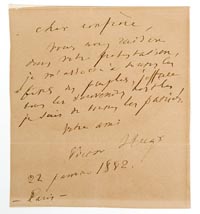 |
Hugo, Victor (1802-85)) French poet, novelist, playwright, and statesman; best known outside of France for Les Misérables and The Hunchback of Notre Dame. Autograph Letter Signed, one page, 5 x 4½ inches, Paris, Jan. 22, 1882. To an unidentified correspondent: "Dear Colleague, You are right in your protestation. I associate with all…people. I erase all hostile memories. I am from all countries! Your friend Victor Hugo." Trimmed and affixed at right edge to another sheet. Three years after writing this letter, Hugo died. Over 2,000,000 people attended his funeral and he was interred at the Panthéon, where he shares a crypt with Émile Zola and Alexandre Dumas.
Estimated Value $800 - 1,000
View details and enlarged photo
| Realized
$1,440 |
Lot 186 |
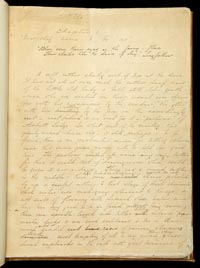 |
Molesworth, Mary Louisa (1839-1921) Scottish writer. She wrote for adults under the pseudonym Ennis Graham and for children under the name Mrs. Molesworth; best known for children's books such as Carrots: Just A Little Boy (1876) and The Cuckoo Clock (1877). Her books, aimed at young girls, delivered Victorian values.
Autograph Manuscript titled "Us," 175 pages (last page is missing), 10½ x 8½ inches, n.d. Written in black ink in a hard-cover book. Chapter 1 is titled, "How they came to be 'us'". Each chapter is headed by a quote from a poet. The writing is very neat, with occasional corrections.
Estimated Value $18,000 - 20,000
View details and enlarged photos
| Unsold |
Lot 187 |
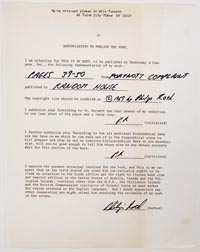 |
Roth, Philip (1933 -) American author; winner of many literary awards, including the 1997 Pulitzer prize. Document Signed twice, initialled twice, and accomplished in Roth's hand, one page, 11 x 8½ inches, n.p., n.d. An "Authorization to Publish the Work." Roth selects pages 39-50 from Portnoy's Complaint to be used as a representation of his work in the book, This Is My Best, to be published by Doubleday & Company, Inc. He signs at the bottom as the "Author," and on the line giving the copyright line. Portnoy's Complaint, published in 1969, was in the form of a monologue framed as a psychoanalytical session. Its explicit sexuality was very controversial.
Estimated Value $200 - 300
View details and enlarged photo
| Realized
$264 |
Lot 188 |
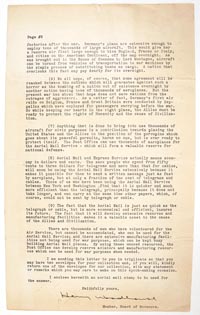 |
Woodhouse, Henry & French President Raymond Poincaré, Document Signed by Henry Woodhouse as a member of the Board of Governors of The Aero Club of America, two pages (pages one and four of a bifolium), 14 x 8½ inches, on Aero Club of America stationery, New York, Aug. 12, 1918. Addressed to French President Raymond Poincaré, requesting that he sign one of the first envelopes flown by aeropost (not present). Signed on the otherwise-blank page three by Poincaré ("with his best congratulations, 31 August 1918") and by Woodhouse on page four. Fine. An early aeronautical item. Henry Woodhouse (1884-1970) was an Italian-born US aviation enthusiast, magazine publisher, speculator and forger of historical documents. Raymond Poincaré (1860-1934) served as Prime Minister of France on five separate occasions and as President of France from 1913 to 1920.
Estimated Value $250 - 300
View details and enlarged photos
| Unsold |
|
|